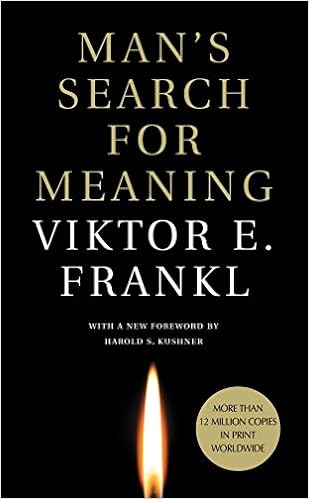Choose This Day
Victor Frankl was a Jewish neurologist who lived through the Holocaust. To try to save his family and his life, it looks like he did some unethical experimentation on other Jews for the Nazis, but he and his family were eventually imprisoned anyway. His wife and immediate family all died; he survived alone.
Frankl was a neurologist and psychologist, a doctor, and while he was in the concentration camps, he observed the people around him. He wanted to know what psychological factors make the difference between life and death when people are at the very limits of pain and suffering.
He wrote a book about his experience and his observations, Man's Search for Meaning. He concluded that no matter how much someone suffered, the difference between life and death was whether someone had a purpose for living.
Whether someone was living for the day when they could take revenge on the Nazis or whether someone hoped they could somehow lighten someone else's suffering, having a why made the difference.
Frankl also observed that even in the most extreme limitations, people can still make choices. The choice may be simple, just choosing between showing kindness and cruelty to a fellow prisoner, and it may not change anything for either prisoner, but every person still had the choice.
When people make the choice to be kind, that is evidence that God is giving grace to them. God's grace showed up even in concentration camps.
God's grace shows up in my life, too. I was reflecting this week on how the press of the academic year and its events can make me feel pushed around, like all I can do sometimes is react to deadlines. Frankl reminds me that my circumstances aren't actually that limiting, and other people in far more limiting circumstances have allowed God's grace to show through in their choices. I can too.
Galatians 5 tells us to expect these choices. The flesh desires what is contrary to the Spirit, and the Spirit contrary to the flesh. They're in conflict with each other. God tells us to walk in step with the Spirit, so He intends to give the grace we need to do it. But we still have to choose: will we be led by the Spirit?
In Knowing Christ Today, Dallas Willard pictures the will, our ability to choose, as really only being able to resist impulses, not create them. I think he's right. Each choice involves saying no to one thing and yes to another. A no to the flesh is a yes to the Spirit. Both the flesh and the Spirit ask us to submit to them.
We can resist the flesh because God gives us grace—or we can resist God's grace and make provision for the flesh to fulfill its lusts (Rom. 13:14).
The choice is mine.
The choice is yours.
Frankl was a neurologist and psychologist, a doctor, and while he was in the concentration camps, he observed the people around him. He wanted to know what psychological factors make the difference between life and death when people are at the very limits of pain and suffering.
He wrote a book about his experience and his observations, Man's Search for Meaning. He concluded that no matter how much someone suffered, the difference between life and death was whether someone had a purpose for living.
Whether someone was living for the day when they could take revenge on the Nazis or whether someone hoped they could somehow lighten someone else's suffering, having a why made the difference.
Frankl also observed that even in the most extreme limitations, people can still make choices. The choice may be simple, just choosing between showing kindness and cruelty to a fellow prisoner, and it may not change anything for either prisoner, but every person still had the choice.
When people make the choice to be kind, that is evidence that God is giving grace to them. God's grace showed up even in concentration camps.
God's grace shows up in my life, too. I was reflecting this week on how the press of the academic year and its events can make me feel pushed around, like all I can do sometimes is react to deadlines. Frankl reminds me that my circumstances aren't actually that limiting, and other people in far more limiting circumstances have allowed God's grace to show through in their choices. I can too.
Galatians 5 tells us to expect these choices. The flesh desires what is contrary to the Spirit, and the Spirit contrary to the flesh. They're in conflict with each other. God tells us to walk in step with the Spirit, so He intends to give the grace we need to do it. But we still have to choose: will we be led by the Spirit?
In Knowing Christ Today, Dallas Willard pictures the will, our ability to choose, as really only being able to resist impulses, not create them. I think he's right. Each choice involves saying no to one thing and yes to another. A no to the flesh is a yes to the Spirit. Both the flesh and the Spirit ask us to submit to them.
We can resist the flesh because God gives us grace—or we can resist God's grace and make provision for the flesh to fulfill its lusts (Rom. 13:14).
The choice is mine.
The choice is yours.



Great post of important thoughts. Thanks for sharing them with us!
ReplyDelete